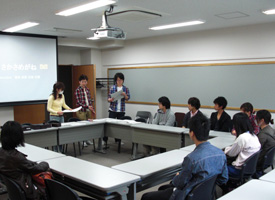Katarina Woodman D2
2024.9.9更新
woodman.irene.54h st.kyoto-u.ac.jp
st.kyoto-u.ac.jp
研究領域(日本語版)
多言語主義(Multilingualism)は、一般的な用語として、個人が日常生活において一つ以上の言語を使用できる状態を意味します。「言語習得」とは、言語の構造、規則、表現などを認識し理解する能力を獲得する過程を指します。一方、「言語使用」とは、社会的文脈におけるコミュニケーションにおいて言語を実際に適用し利用することを指し、これらの言語がどのように学習されるかではなく、個人または社会が日常的なやり取りでどのように言語を使用するかに焦点を当てます。包括的な多言語主義の視点は、「言語習得」と「言語使用」の両方の概念を統合し、多言語話者とコミュニケーションの文脈との相互作用を考慮することにあります。本研究では、多言語主義の視点を通じて、日本語を第二言語として使用する日本語話者、特に日本に住む外国人住民(移民や日系人など)の言語使用に注目します。具体的には、1) 日本語がJSL話者の認知処理に与える影響、2) JSLにおける文化適応の影響、3) 日本社会におけるJSLの社会的文脈という三つの主要な視点から検討します。
Research Area (English Version)
Multilingualism, as a generic term, means when an individual can use one or more languages in their daily lives. Language acquisition is the process of acquiring the capacity to perceive and comprehend language (such as structures, rules, and representation). In contrast, language use is the practical application and utilization of language in communication within various social contexts, focusing on how individuals or societies employ language(s) in their daily interactions rather than how these languages are learned. A holistic perspective of multilingualism involves integrating ideas of both "language acquisition" and "language use," considering the interaction between multilingual speakers and the communicative context. In this research, we aim to look at the language used by Japanese speakers as a second language, particularly foreign residents in Japan, such as immigrants and Nikkeijin, through the perspective of multilingualism. Therefore, we look at three primary perspectives: 1) the influence of the Japanese language on cognitive processing in JSL speakers, 2) the influence of acculturation in JSL, and 3) the social context of JSL in Japanese society.
学歴
2024年4月 京都大学 大学院 教育学研究科 博士課程 卒業
2024年3月 京都大学 大学院 教育学研究科 修士課程 卒業
2022年4月 京都大学 大学院 教育学研究科 修士課程 入学
2021年5月 Central Michigan University 哲学と心理学専攻 卒業
2020年8月 Central Michigan University 哲学科 入学
2019年8月 奈良教育大学 日本語コース 留学
2017年8月 Central Michigan University 心理学科 入学
研究業績 (Research Works)
論文
- Hitsuwari, J., Hayashi, T., Woodman, K., Liu, X., Takeura, K., Nishida, S., TO, M., & Nomura, M. (2023). Scent of Poetry: Influence of Olfactory Imagery during Haiku Appreciation on Aesthetic Evaluation. The 45th Annual Conference of the Cognitive Science Society, Sydney, Australia.
- Hitsuwari, J., & Hayashi, T., Woodman, K., Du, M., Morita, M., Takiguchi, S., Yamashita, Y. & Nomura, M. (2024). Sauna and Mindfulness: How Sauna Bathing Affects Psychological States and Traits Related to Bodily Sensations and Emotions [PREPRINT]. Research Square.
- Woodman, K. & Manalo, E. (2024). Audiovisual Speech Perception of Multilingual Learners of Japanese. International Journal of Multilingualism. https://doi.org/10.1080/14790718.2024.2402330
- Central Michigan University, Park Lab (神経科学)
Central Michigan University, Davoli Lab (知覚心理学)
Kyoto University, Manalo Lab (教育心理学)
実験室での経験
学会発表
- Woodman, K. (2023). Audiovisual Speech Perception in Japanese Second Language Listening. International Conference on Embodied Cognitive Science 2023, Okinawa, Japan
- Woodman, K. (2024). Audiovisual Speech Perception in Japanese L2 and Multilingual Gaze Behavior. 27th Meeting of Association for the Scientific Study of Consciousness. Tokyo, Japan
その他 (Others)
■倫理研修■
- 最優秀ポスター賞、2023年身体的認知科学国際会議 (OIST)
社会行動科学のCITI
認定ネズミとラットの取り扱い、セントラルミシガン大学
研究の基礎のチュートリアルクラス、京都大学 - 京都大学 教育学部 教育心理学系科目「初級実習」 ティーチング・アシスタント 2024年度
「Dominant Leaders Establish Social Assurance in East-Asian but Not in Western Cultural Contexts」翻訳者, 一橋ビジネススクール, 2023年度
日本語文化についてフリーランスライター, Spectrum Consulting Japan 合同会社, 2022年度~
ブラウンズ英会話 英語教師2022年度
セントラルミシガン大学チュータリングセンター 日本語チューター2021年度
「Psychedelic drugs and perception: a narrative review of the first era of research」リサーチ・アシスタント, Central Michigan University 心理学科, 2018年度
■職歴■
ページトップへ ▲









